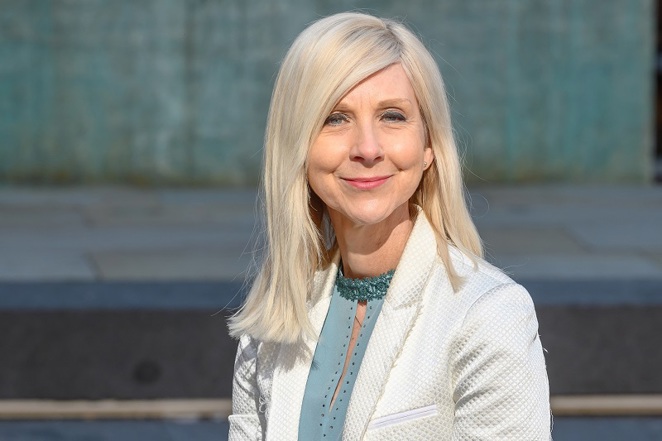Press release posted 14 February 2024
Natalie Yates-Bolton, 57, a senior lecturer in nursing at the University of Salford, has had cancer 5 times, and now cancer free, shares her inspirational story of how cancer has spurred her on to make the most of life, and set herself some incredible challenges.
The ultra-marathon runner, who lives with her husband, Gary, in Chadderton, near Oldham in Greater Manchester has been on a targeted therapy* for 6 years which allows her to have a good quality of life and she currently has no signs of cancer. Natalie takes the drug, called Palbociclib** (also known as Ibrance), in tablet form once a day for three weeks, then has a week off, before starting the next cycle.
Feeling fit and well, Natalie enjoys running and has to date taken part in 6 marathons, 3 ultra-marathons and 3 triathlons. In May last year, she completed the Isle of Wight ultra-marathon which involves running 35 miles around half the island. And in June she walked the third leg of the famous Camino de Santiago pilgrim’s trail in France with her mother.
Her next challenge is to hike the ‘Wainwrights’ - 214 peaks (also known as fells) in the Lake District, which she plans to do over the next few years inviting friends and family to join her on different hikes. She has even created a handbook so they can choose the route they’d like to do and book themselves in to join her.
Natalie was aged just 22 and a student in her third year at Surrey university, 250 miles from home, when she was first diagnosed with Hodgkin lymphoma. Refusing to take a break from her degree in nursing, she worked on a demanding neurological ward while having radiotherapy treatment after her shifts.
Then 20 years ago, when she was 37 and married with 2 young daughters, Lucy and India, Natalie started to suffer from back pain and itchy skin and a scan revealed a tumour attached to her heart pressing on her oesophagus, and she discovered the lymphoma had returned. With the support of her family, she fought her second battle with cancer and successfully completed her treatment in 2004.
In 2009 cancer struck a third time and she was diagnosed with breast cancer at the age of 43. She found a lump at the side of her right breast, and she underwent surgery followed by chemotherapy and radiotherapy and was forced to take a year off work while she underwent this intense treatment. Less than a year later, Natalie noticed a lump in her side which was cancerous and was removed with surgery, and then in 2017 the cancer returned for a fifth time. In total, she has endured 11 operations, 30 sessions of chemotherapy and 55 of radiotherapy.

Natalie, who has also gained a PhD, become an executive coach and learnt to become a milliner said: “The Christie has cared for me for the last 21 years and thanks to the wonderful medical team who have treated me, I feel enabled and empowered to live an amazing life and not be a victim of cancer. I am living proof you can rebuild your life after treatment and come through it stronger, and more appreciative of life.
“I have an amazing time in all aspects of my life, and I now want to make a difference to the lives of others. Through the university I’ve had the incredible opportunity to work on World Health Organisation projects in Eswatini (formerly Swaziland) in Africa and Moldova which is a country next to Ukraine. The amount I now do even takes me by surprise and I really don’t think I would have done half as much if it wasn’t for the cancer.”
Dr Sacha Howell, consultant oncologist at The Christie, who has been Natalie’s doctor since 2009 said: “Natalie has now had 75 cycles of Palbociclib. It was a relatively new therapy when she started on it 6 years ago, but now it’s become a commonly used treatment for some patients with metastatic breast cancer. The success of treatments like this, that control the cancer, and thus maintain the quality of life, make a real difference to patients like Natalie. She is an exceptional and inspirational lady who is leading a full and active life despite the cancer.”
*Targeted therapies use drugs that are directed at the proteins on the breast cancer cells that help them grow, spread and live longer. The drug is designed to kill the proteins without damaging the surrounding healthy cells.
**Palbociclib is used for a type of breast cancer that is hormone receptor positive (HR+) and human epidermal growth factor receptor negative (HER2 -). Palbociclib is a type of cancer growth blocker that targets the proteins cyclin dependant kinase 4 and 6 (CDK4 and CDK6) on cancer cells. CDK 4 and CDK 6 are proteins that stimulate cancer cells to grow and divide. Palbociclib works by blocking these proteins. It aims to slow or stop the growth of the cancer.
